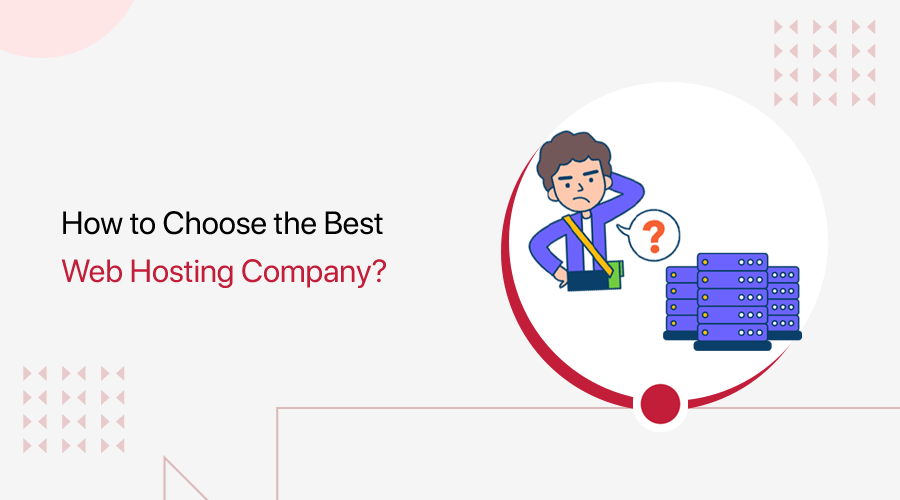
Wondering what affiliate marketing is? Do you know how you can earn from affiliate marketing? If not, then you’ve come to the right place.
In simple language, affiliate marketing is the process of earning a certain amount of commission or profit by promoting other companies’ products or services. It’s also known as a performance-based marketing strategy where you get paid for the sales you make.
There are various ways of earning money online. Yet many people and business owners prefer affiliate marketing as their income source.
But Why?
To answer all these questions, we’ve written this article to show how affiliate marketing works. By the end of the article, you’ll also know how to start affiliate marketing and be a successful affiliate marketer.
So, stick with us till the end of the article.
Keep Reading!
What is Affiliate Marketing?
Affiliate Marketing is one of the oldest and most popular forms of Internet marketing tactics in use. It’s the process where you promote other companies’ products, and if someone buys the product based on your recommendation, you get a certain amount of commission.

Affiliate marketing makes it easy to earn money from product sales without creating its products. Also, the commission rates vary depending on the company and products. You can earn from 5% to 50% or even more depending on your promoting products.
Moreover, you can recommend the product to anyone: readers, friends, relatives, etc.
Today affiliate marketing is one of the effective ways of earning online with a small investment.
- Affiliate marketing spending in US will roughly be increased by 12 billion in 2025. (Source)
- 5.3% of the top 1 million websites used affiliate programs worldwide in October 2024. Source)
Let’s be a bit clearer with an example!
Suppose you’re promoting products like clothing, books, and household items from Amazon (the biggest eCommerce company). For this, you need to sign up and generate custom links to sell Amazon products. If someone purchases through your link, then you earn a specified amount of commission from it.
Moreover,
- The products can be of any type, from daily usable products to any digital products like ebooks or software, etc.
- And, you can promote such products on your affiliate website, social media sites, YouTube channels, etc.
Additionally, if you own a product or aim to increase its sales, affiliate marketing can be a highly effective strategy.
Types of Affiliate Marketing and Why it’s Popular?
A few years ago, businesses used to pay huge amounts to promote their products on TV, radio, print ads, etc., to grow their business. But today, the scenario has changed. At present, all the large and small business organizations are trying to find new ideas to increase the business’s growth.
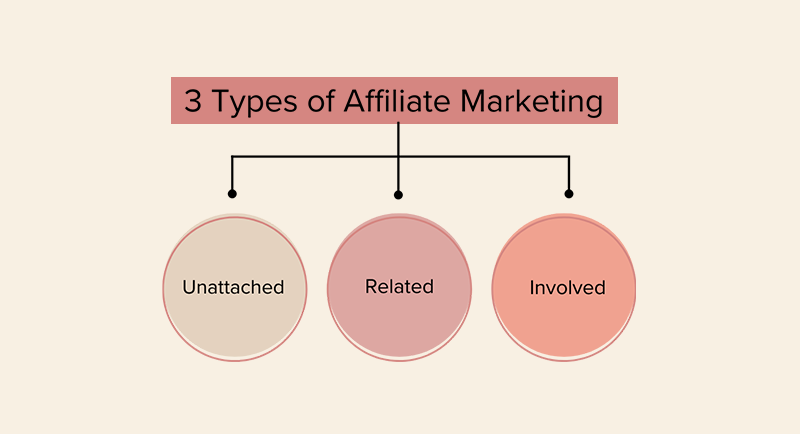
Affiliate marketing is an effective marketing strategy that benefits both merchants and affiliates. For merchants, it helps to increase business growth, whereas affiliates earn a good amount of money without owning the products.
So, here are different types of affiliate marketing you can look into!
1. Unattached Affiliate Marketing
Unattached affiliate marketing is like being a friendly messenger for products or services without having a personal connection to them. It’s like you’re telling your friends about a cool gadget you found, but you don’t own it or use it personally.
In this case, you earn a commission when your friends buy the gadget based on your recommendation.
Why is Unattached Affiliate Marketing Popular?
- Simple and Easy: It’s straightforward. You don’t need to use the product or have a personal story. Just share the link and earn if people buy through it.
- Open to Everyone: Whether you’re a blogger, a social media enthusiast, or just someone who likes recommending things, anyone can join and start earning.
- No Product Ownership Required: You don’t have to own or buy the product. You’re more like a helpful guide, pointing people to things they might like.
2. Related Affiliate Marketing
Related affiliate marketing involves promoting products or services that are directly connected to the content or niche of the affiliate. Instead of endorsing random items, affiliates choose offerings that align with the interests and preferences of their audience.
For example, if someone runs a blog about travel, they might become an affiliate for travel gear, booking platforms, or travel insurance. This ensures that the promoted products resonate with the audience’s passion for travel.
Why is Related Affiliate Marketing Popular?
- Relevance to Audience: It’s like recommending things that make sense for the people who follow your content. When the promoted products align with what your audience is already interested in, they are more likely to trust your recommendations and consider making a purchase.
- Increase Conversion Rates: Since the products are related to the content, the chances of your audience clicking on your affiliate links and buying something increase. It’s like recommending a good book to someone who loves reading. They’ll likely check it out!
- Enhanced Credibility: Promoting things that directly relate to what you usually share or discuss makes the audience see you genuinely interested in providing value. This builds trust, making them more likely to take your recommendations seriously.
- Easier Integration into Content: When the promoted products seamlessly fit into your content, it doesn’t feel forced. It’s like mentioning a favorite gadget during a tech review. So, it flows naturally, and your audience finds it relevant.
3. Involved Affiliate Marketing
Involved affiliate marketing is like telling a friend about a product or service you genuinely love and have used. It goes beyond just promoting!
It involves sharing your personal experiences, thoughts, and feelings about the product. Instead of merely recommending, you’re essentially saying, “I’ve tried this, and here’s why I think it’s great.”
Why is Involved Affiliate Marketing Popular?
- Trust Building: In the online world filled with ads, people value recommendations from individuals they trust. Involved affiliate marketing builds trust because it feels like a friend sharing a good find.
- Connection: It creates a deeper connection between the affiliate and the audience. The audience feels a personal touch, knowing that the affiliate isn’t just pushing a product for the sake of it.
- Real Testimonials: It’ll provide real, relatable testimonials. And the audience gets insights from someone who has genuinely used and benefited from the product.
In the last few years, affiliate marketing has become one of the biggest forms of business advertising.
- There are 107,179 companies worldwide that have affiliate programs. (Source)
- While it’s believed that there will be spending of around $15.7 billion in 2025 for affiliate marketing. (Source)
Another reason why affiliate marketing is so popular is that you are your boss and are free to build your marketing strategy. Also, with a simple and easy way to start, anyone can join affiliate marketing and work from home, workplace, college, etc.
Benefits of Affiliate Marketing
There are many benefits of affiliate marketing. Here we’ve discussed a few of them.
i. Passive income
Passive income is the money you can earn without being involved directly and regularly in any business. Or the money you make from a business you’re not actively engaged with.

Unlike other businesses, affiliate marketing is not a one-night earning source of income. You earn a commission by promoting other products. But you’re not paid until your referred customer takes some action or purchases a product from the merchants’ platform.
It might take a few days, a few months, or years to receive payment from affiliate marketing, which is known as a passive income source.
ii. No customer support
Since affiliate marketing is all about promoting other company’s products, any issues that come along with the product are handled by the merchants or product owners. Being an affiliate, you don’t have to worry about customer support for any problems.

iii. Less investment
Starting an affiliate marketing requires less amount of investment and time. It can be done from any platform (blog, YouTube, social media) virtually with no or small investment at all. Also, you don’t need to create a product of your own, so it doesn’t cost much to get started.

iv. Performance-Based Rewards
Affiliate marketing is an entirely performance-based marketing model that pays or gives a commission to affiliates after they complete actions like sales. It checks the number of sales made or executes any action by visitors and pays accordingly.

v. Own Workflow and Location
Affiliate marketing gives a separate space to work, and you’re the boss of your workspace and can decide what to do next. There are no tight deadlines and schedules to complete the task. Also, affiliate marketing can be done by anyone from anywhere.

How Does Affiliate Marketing Work?
Affiliate marketing is a performance-based business strategy that allows a product owner to increase sales from affiliate marketers’ audiences. At the same time, affiliate marketers earn commission by promoting other products with small or zero investments.
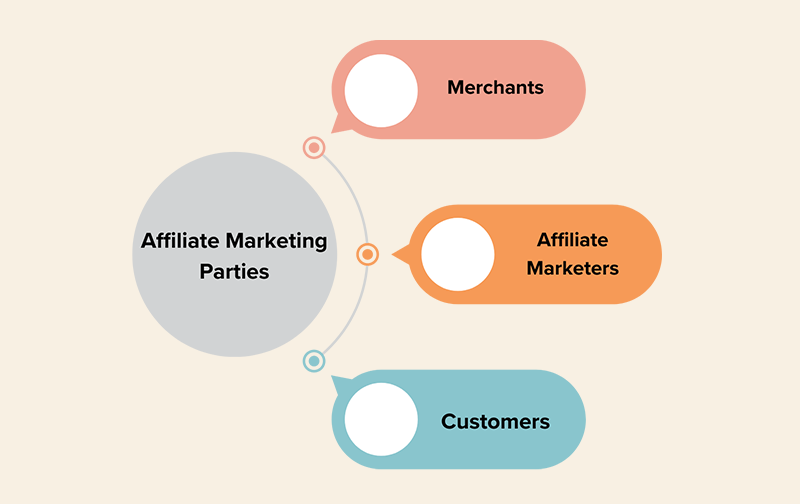
So, there are mainly 3 parties involved in the whole process of affiliate marketing.
- First, the merchants or the product owners who have products to sell.
- Second, the affiliate marketers help in selling the merchant’s products.
- And third, customers who buy from the affiliate marketer’s website.
Now, let’s discuss these 3 pillars of affiliate marketing in more detail. Plus, there’s sometimes one more party involved, which we also discussed.
i. The Merchant
The merchant is the product creator, seller, brand, retailer, or brand with a product/service on the market. They can also be large e-commerce or business companies like Amazon, ThemeForest, HostGator, etc.
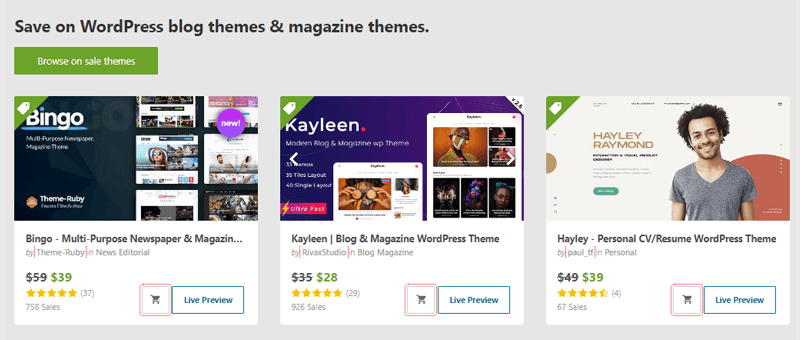
These companies own the products or services to make available for the people to purchase. Also, the products can be anything from physical products like household items, and clothing to e-books, software, etc.
Moreover,
- Merchants can also be single individuals like freelancer graphic designers or course creators.
- The merchant could be a large company owner.
The merchants need an affiliate program if they want affiliate marketers to promote their products and help in selling more. Now, you’ve 2 choices to have an affiliate program.
- Create an affiliate program yourself.
- Or join an affiliate network.
If a merchant wants to run an affiliate program independently, there’s some extra work. An affiliate program is an entirely different system that should handle applications, marketers’ accounts, affiliate link generation, and more.
Plus, they’re responsible for implementing the sales tracking system and monitoring the sales results. In the end, the merchants pay affiliates for every sale they make with the merchant’s product or services.
But if they join an affiliate network, then merchants don’t have to do all of this because the network manages everything.
We’ve explained about affiliate networks in the 4th point.
ii. The Affiliate
Affiliates, also known as publishers, distributors, or advertisers, can range from a single individual to an entire small or large company. They promote the products or services of the merchants.

Additionally, bloggers, publishers, content creators, or those having a high social media following can easily participate in affiliate marketing. And, most affiliate marketers share their products on social media, blogs, websites, etc.
Why share on social media?
To draw customers’ attention and convince them to purchase the product. If the customers buy the product, the affiliate receives a specific amount of commission from each sale made. However, the amount of commission depends on the affiliate program’s terms and conditions.
Likewise, affiliate marketers also need to focus on building their audiences. Promoting products to someone who doesn’t buy them is a waste of time and marketing dollars. However, most affiliate marketers have a specific audience who purchase their products or services.
iii. Customers
Customers purchase products from affiliate marketers. They let the affiliate marketing go around and make the transactions.

Besides, the transaction can be anything from clicking a link to submitting the form and purchasing the products. Unless and until the customers make the transactions, there aren’t any chances of commission or revenue to be shared.
However, the customers don’t need to know that they are part of affiliate marketing or network. Whereas, some affiliate marketers allow their customers to see or know that they are part of affiliate marketing, and some marketers don’t allow it.
Moreover, customers don’t need to pay an additional amount to purchase from the affiliate advertisers. They can purchase the items at the regular price or sometimes even at discounted prices.
iv. The Network
As mentioned above, affiliate marketing is not always limited to merchants and affiliate marketers. There’s one more party that helps in affiliate marketing: the network.

The affiliate network is the middleman, connecting the merchant and the affiliate. In other words, it acts as a manager between the affiliate and the merchants.
However, for getting into affiliate marketing, a network is not that necessary. But choosing an affiliate network handles all the technical and administrative stuff like tracking, support, payments, etc.
So, you can technically promote a product or item created by someone else, sell it to customers, and then get a commission once customers purchase it.
However, joining an affiliate network such as ClickBank, ShareASale, etc., handles the payment system, product delivery, and other services.
An affiliate network is best if you don’t have time to manage and track reports, payments, etc. Merchants also choose affiliate networks if they want to promote products from various affiliate marketers or publishers.
It depends on your business, whether you need to go with an affiliate network or not.
How do Affiliate Marketers Get Paid?
Affiliate marketing is a notable source of income for marketers nowadays. You don’t need to be technically strong when starting up affiliate marketing. Also, with a small investment, you can join affiliate marketing and set up your own business.
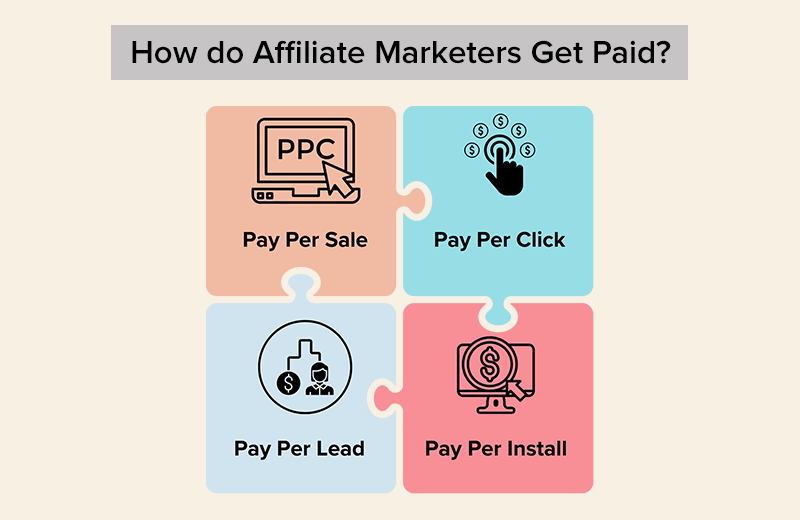
But there arises a question: How much earning do you earn from affiliate marketing, and how do affiliate marketers get paid?
What you need to know is,
- The pricing structures vary from each other.
- There is no limit to how much money you can make with affiliate marketing.
- Earning from affiliate marketing directly depends on the number of products/items you sell.
However, if you want to earn from affiliate marketing, customers don’t always need to purchase the items or products. Affiliate marketers get paid in different ways after they promote items on various platforms.
Here, we’ll discuss three major ways affiliate marketers get paid from affiliate marketing.
a. Pay Per Sale
Pay-per-sale is one of the most common affiliate marketing payment models. Marketers earn a commission when a referred customer purchases through their affiliate link.
How does it work?
Affiliates receive a percentage of the sale amount or a fixed commission for each successful sale. This model incentivizes affiliates to focus on promoting products or services that lead to actual conversions.
b. Pay Per Click
In the Pay-per-Click model, affiliates earn money based on the number of clicks generated through their affiliate links, regardless of whether the referred users make a purchase.
How does it work?
Each click on the affiliate link contributes to the affiliate’s earnings. This model is more focused on driving traffic to the merchant’s site, and the number of clicks measures the effectiveness.
c. Pay Per Lead
Pay Per Lead compensates affiliates for generating leads or potential customers. This doesn’t necessarily involve a sale; instead, affiliates are paid for getting users to take a specific action, like signing up for a trial or filling out a form.
How does it work?
Affiliates receive a commission when the referred users complete the desired action. This model is often used when companies prioritize building their customer base or collecting leads.
d. Pay Per Install
Pay Per Install is prevalent in the software and app industry. Affiliates earn a commission for each successful installation of the promoted software or application through their affiliate link.
How does it work?
Affiliates are rewarded when users follow their link to download and install the specified software. This model is effective for companies looking to increase their user base through installations.
Each payment model serves different business goals, allowing companies to tailor their affiliate programs to suit their specific objectives. While providing affiliates with flexibility in choosing the models that align with their strategies.
How to Start Affiliate Marketing for Beginners? 6 Steps to Success
Affiliate marketing is one of the popular methods of earning money online. After knowing about what affiliate marketing is, now it’s time to concentrate on the main topic, ‘How to start affiliate marketing?’
To succeed in affiliate marketing, there are many steps to follow before making your first sale and earning some commission. But most importantly, you must have the dedicated willingness to put your time and effort into affiliate marketing.

Here we’ve broken down the affiliate marketing process into 6 steps for beginners. Follow these steps that’ll help you to earn a commission from your first sale.
Step 1: Decide Your Niche and Platform
The first step of starting affiliate marketing is to select the products, services, or anything that you’re passionate about. Or you already have experience with it.
Choose something you’re more interested in.
If you’ve got a deep interest in the things you’re trying to sell, then there’s more chance that visitors will convert to customers. Also, while following your passion, make sure to choose the one that has a profitable earning income.
For example, if you are interested in WordPress themes and plugins, you can do affiliate marketing from CodeCanyon or ThemeForest. You can also promote sports-related topics and products, beauty, music, and more.
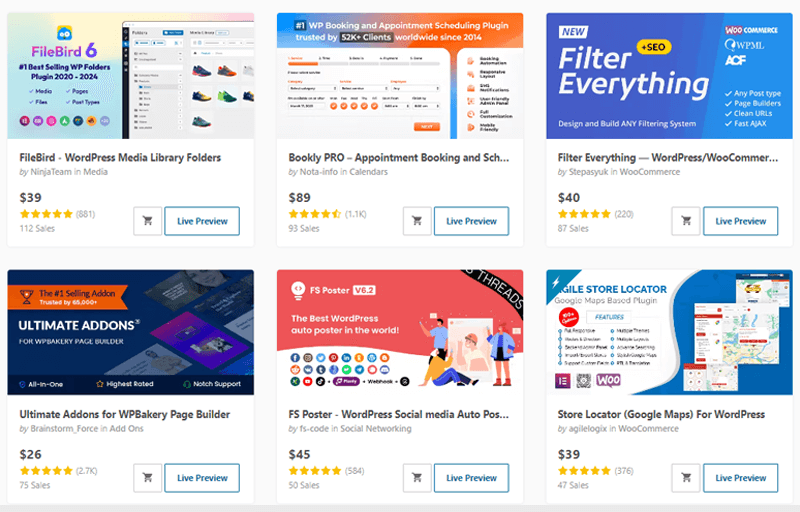
Once you find the products or services you’re going to promote, the second most important part is finding a platform for affiliate marketing. Generally, affiliate marketing can be done from any platform: websites, Blogs, YouTube channels, Social Media sites (Facebook, Instagram), etc.
But how do you choose which of these platforms is the best for you?
No worries, here we’ll discuss how you can start your affiliate marketing with these platforms. Then you can decide which one suits your business.
i. How to start affiliate marketing with blogs?
Choosing blogs as your affiliate marketing is the right decision if you already have an active blogging platform or planning to have one. There are different blogging platforms you can start with.
To name a few of them:
These platforms are easy to start and set up to start your blog.
You can also check our guide on how to start your WordPress blog to start your blogging platform.
As a blogger,
- You can do affiliate marketing by adding affiliate links to your blog’s articles.
- When the readers visit your blog, most probably they click on the link that directs them to the merchant’s marketplace.
So, if readers of your blogging platform buy the products or take action on the merchant’s platform, you get a commission.
Your blog content can be anything related to technology, reviews, or biographies about different personalities. Make your content simple and easy to read.
ii. How to start affiliate marketing with social media?
Social media has become one of the most popular affiliate marketing platforms in the past few years. Promoting content through social media is free and user-friendly. Make sure to choose the best social media platform (Instagram, Facebook, YouTube, TikTok) for your business.

The social media platform is best for affiliate marketers having a large number of fans and followers. However, it’s not necessary that you need to be a celebrity or a popular figure to promote your content. Your affiliate content needs to be stronger and catchy for the audience.
How to choose?
- If you are interested in clothing, beauty, or health-related topics, you can choose Instagram.
- Similarly, YouTube is best if you’re a vlogger or own YouTube channels with interesting content.
There are many YouTube channels with affiliate marketing. One of the fine examples is Tatiana James, who focuses on online business and selling Amazon products. Facebook is best for those focusing on finance or any topic you’re passionate about.
For example, You choose the YouTube platform for affiliate marketing. Create content and upload it on your channel that requires no charges. You can upload your affiliate link in your YouTube video description.
Now, if someone makes a purchase using your affiliate links, you’ll get some commission from the sales made.
When choosing an affiliate marketing platform, make sure to go with one that can build a larger audience and increase affiliate sales. Starting your affiliate marketing on the above platform requires minimal or no cost.
Step 2: Find Affiliate Programs to Join
The next step is finding and joining the affiliate programs. Before we move on, it’s necessary to know what an affiliate program is.
Shortly, an affiliate program is also known as an associate program. It’s an arrangement in which merchants pay you (the affiliate) a commission when an actual sale is made from the merchant’s site or any action is taken.
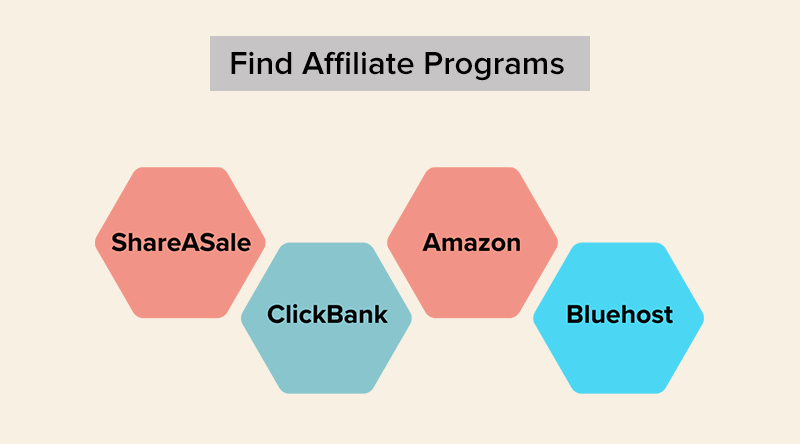
There are thousands of affiliate programs that you can join easily without paying anything.
To name a few of them,
- Amazon
- Bluehost
- ShareASale
- ClickBank, etc.
We’ll go through these programs in a more detailed way in the next subheading, ‘best high paying affiliates.’
All these affiliate programs require specific criteria to qualify as an affiliate marketer. When choosing an affiliate program, give some time to research the right platform. Because this is where your income will come from.
When choosing the affiliate programs, you need to consider the following tips:
Things to Consider While Choosing Affiliates Programs
- High Commission Rate: Different affiliate programs have various commission rates. The higher the commission rate, the higher the income. So, choose the affiliate programs that give you a satisfactory commission rate.
- Market Reputation: Choose affiliate programs with a good market reputation. For this, you can browse through different blogs or affiliate forums. Moreover, you can go through each affiliate program’s website and judge whether it fits your business needs or not.
- The kind of product: Every product you choose for affiliate marketing does not necessarily fit into any affiliate program. So, the products or services you decide to promote must be relevant to affiliate programs.
- Two-tier affiliate program: In this affiliate program, you can earn a double or two-tier commission. The first-tier commission is like the usual affiliate program. In the second-tier commission, you make a commission from the sales generated by the people you referred to previously.
Once you find your affiliate program that best suits your business, sign up for their affiliate program. After signing up, you’ll get a unique link known as an affiliate link.
For those who don’t know what an affiliate link is, it is a URL that tracks the traffic sent from affiliate markets affiliate platforms to the merchant’s platforms.
Once your affiliate link is ready, copy and paste it into your content. Now when one of the visitors clicks on the affiliate link available from your content, it redirects to the merchant’s platform. If the visitors turn into the customer by purchasing the product, the affiliate is then paid a commission.
Idea to Join Affiliate Program
Suppose you choose the Amazon affiliate program. Open the Amazon affiliate program on the browser. Now you’ll see the Amazon dashboard something like this:
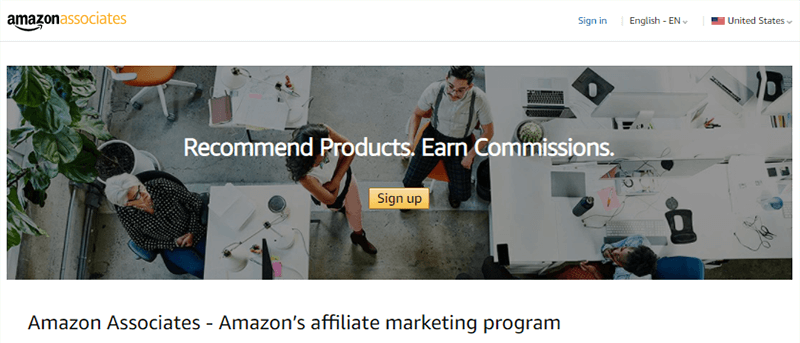
Sign in to the Amazon affiliate program. After signing in through email or phone, you’ll need to fill a form for verification.
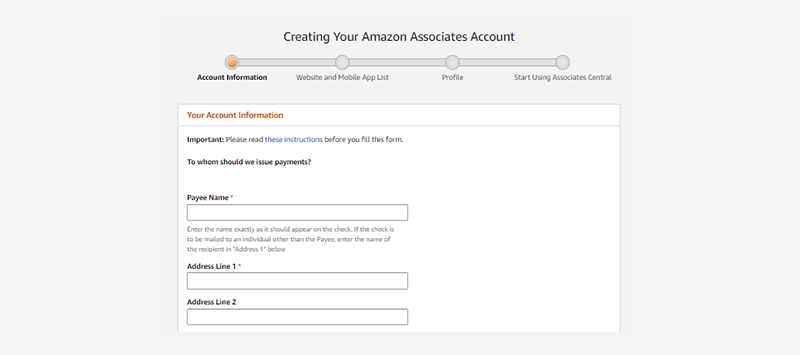
Once your information detail is verified, you’ll get an affiliate link from Amazon. Now you can use this link on any affiliate platform of your choice.
Step 3: Choose Your Products
Affiliate marketing success heavily relies on the products or services you choose to promote. And, choosing the right products is a pivotal step in the affiliate marketing journey.
By thoroughly understanding this step, you set the foundation for a successful and sustainable affiliate marketing strategy.
Here’s a detailed breakdown of this crucial step.
- Understand Your Niche: Your audience has specific interests, and aligning your chosen products with those interests enhances the chances of successful promotion.
- Relevance and Authenticity: The more genuine and aligned the products are with your content, the more likely your audience will trust and follow your recommendations.
- Quality Matters: Your reputation as an affiliate is closely tied to the quality of what you endorse. Recommending low-quality products can harm trust with your audience.
- Consider Your Audience’s Needs: What problems are they trying to solve? What are their interests? Select products that address these needs and align with their preferences.
- Research Affiliate Programs: Look for reputable affiliate programs that offer fair commissions, reliable tracking, and good support. And ensure they align with your goals and values.
- Test the Products: Whenever possible, try out the products or services you plan to promote. Personal experience adds authenticity to your recommendations and provides insightful and convincing content.
Note: The affiliate marketing landscape evolves. Stay flexible and be open to adjusting your product selection based on changing trends, audience feedback, and the performance metrics you gather.
Step 4: Create Great Marketing Content (Optimize Your Content for More Clicks)
High-quality content is the cornerstone of affiliate marketing monetization. Whether a blog, website, product review, tutorial, or other type of content, it’s the content that sells your affiliate product.
Every affiliate marketer must know that quality content is the king of marketing business.
Since affiliate marketing is all about convincing people to products from a merchant’s store, you need to create attractive content to impress your audience. Hence, behind every successful affiliate marketing, there’s some valuable content within it that can fascinate the audiences.
Here are some of the popular types of content for affiliate marketing.
1. Products Reviews
It’s one of the most popular and easy types of content that you can use to promote affiliate products. Here you can write an honest review of the affiliate products based on your research and experience. Also, you need to clarify both the advantages and disadvantages (if any) of the product.

In the end, it’s all about providing trust to the audience from your information on what makes purchasing the product useful.
2. Video Tutorial
A video tutorial is a form of providing information in the video. With video tutorials, the audience can see the appearance as well as the working overflow of the products. It may be software, physical devices, tutorials (recipes, makeup, dye), and many more.
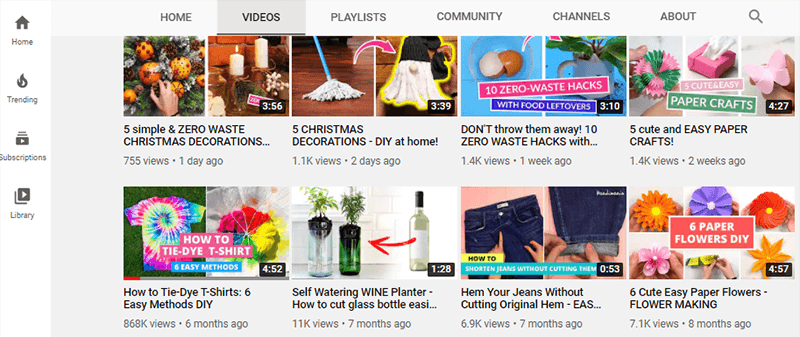
With this type of content, you no longer need to write in words and explain to the audience. The video does it all.
3. Product Comparison
Product comparison is simply figuring out the difference between two or more products and analyzing the best one out of them. When it comes to buying a product, there arises confusion for choosing between almost similar products, and that’s where your comparison works.
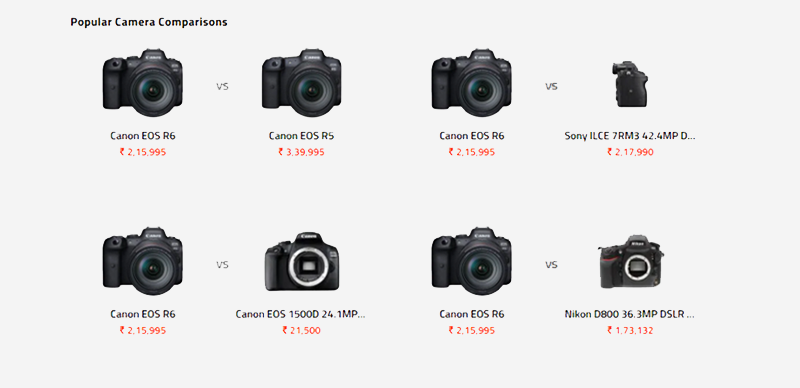
Listing out the best features and including each product’s mini-reviews can help your audience buy the best one.
4. How-to Articles
The how-to article describes how to get the most out of the products or use the features so that the audience generates interest in it. For this, you can start your blog and publish content or post on hosting blogging platforms like Blogger, Medium, etc.
This type of content must include every step of the process and make sure not to include unnecessary information.
Your heading title addresses the consumer pain point, such as How to earn money from affiliate marketing overnight?
After choosing the right type of content,
- Gather all information
- Create affiliate marketing contents that convert the visitors to customers.
Now, there comes a question in mind: how to create quality affiliate marketing content?
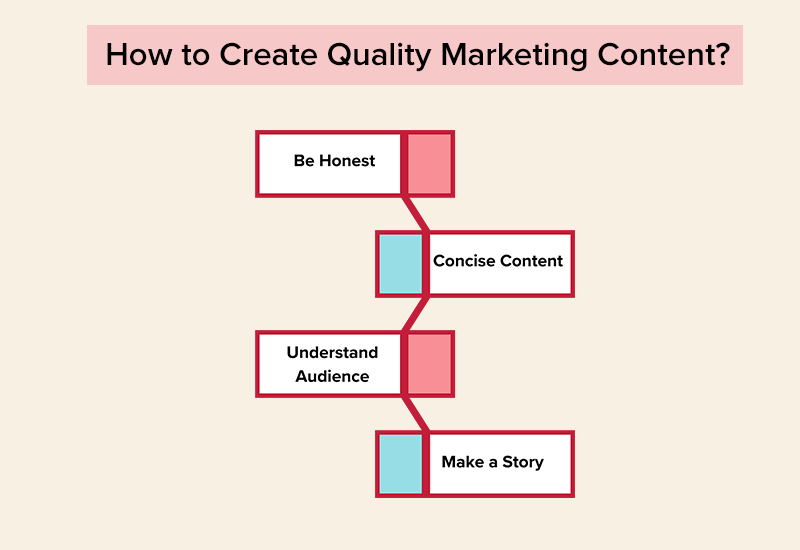
No worries! Here we’re giving you a few tips to improve the quality of affiliate marketing content and optimize your site for more clicks.
i) Be Honest
‘Honesty is the best policy.’ From this quote, what we can understand is being honest is always good and fruitful. Whenever you’re giving information about any of your affiliate products or content, write an honest review of your experience with those particular things.
The audience trusts you, and based on your recommendations, they take action or purchase the product. With this in mind, never express your opinion unless and until you experience the products. These may include physical goods, software, ebooks, and more.
ii) Make Your Content Concise
Writing clear and concise content is very important when creating great affiliate marketing content. This gives a direct, short, and clear description of the affiliate product that makes the reader easier to read and keeps the audience’s attention.
When you’re describing a product or writing reviews, don’t make it too long. Make sure to mention the important features of the affiliate products you’re promoting. The longer the content, the less users will read.
So, make your content up to the point and remove the unnecessary information.
iii) Research and Understand Your Audience
Affiliate marketing is only successful when you have a large number of audiences. In the end, it’s the audience who takes action from the affiliate platform and you, as an affiliate, earn the commission.
Audiences are the center of affiliate marketing.
So, in affiliate marketing, you must focus on products, goods, and services that your audience loves and that are suitable for them. Think about your target audiences and promote your affiliate products based on their choices and needs. Try to bring fresh and new content to your audiences.
iv) Make a Story
Once you start promoting affiliate products from different platforms, don’t advertise them directly. Instead, make it a natural recommendation issued from friends or relatives.
Audiences love the content when they can personally connect to whatever they’re reading.
For this, you need to set up a scenario that allows the audience to imagine having a product or services of their own. When writing the reviews, content connects your audiences emotionally, which manipulates them to purchase it.
Step 5: Drive Traffic to Your Affiliate Marketing Platform
The best way to be successful in affiliate marketing is to promote your products to the audience. Once your products are visible to the audiences, make them take specific action from the affiliate platform. It can be
- Clicking on different downloading links.
- Purchasing products, etc.
But where do these audiences come from?

Once you set up your affiliate marketing platform with the selected product to sell or promote it. Now as a publisher, your main task is to generate the traffic or audiences to your affiliate platform. So, for every publisher generating traffic has to be on the top of the list of priorities.
There are many ways of bringing traffic to your affiliate marketing platform. Let’s discuss some major tips that help to drive traffic to your affiliate platform.
a) Focus on High-Quality Content
High-quality content plays a major role in driving traffic to the affiliate platform. Make sure the content you promote has an eye-catching headline and that you provide valuable content to engage your audience.

b) Make Affiliate Links Visible
Affiliate links play a major role in sending traffic from the affiliate platform to the merchant platform. So, being an affiliate, make sure that the links to any product you’re selling are visible to the customers.
Also, if you want your site visitors to download or watch videos, clearly mention Download Now or Watch it to seek the visitor’s attention.
c) Use Social Media
Social Media is one of the best platforms for increasing traffic to the affiliate marketing platform. Depending on the type of business, you can choose social media platforms for affiliate marketing.

For instance, if your marketing involves fashion, makeup, or art, Instagram is the best platform. You can also create a Facebook group where people with the same idea can join and discuss it.
d) Giveaway Offers
People love gifts and prizes, and giveaways are the best way to drive traffic to affiliate marketing. A giveaway is a campaign in which different brands sponsor a prize, and people must submit entries to win.

So, hosting the giveaway on the page or post filled with affiliate links can attract high-quality traffic to your website.
e) Ask for Feedback
Feedback is a must if you are involved in affiliate marketing. Once your affiliate marketing is online, make a few sales, and generate some customers, reach out to them and ask them to review the service they received.

f) Paid Traffic Source
Platforms like Facebook Ads, Instagram Ads, and Google AdWords are paid traffic sources where you can promote your products and get traffic for your affiliate link. Here you need to spend some amount of money on this traffic source.
g) Build an Email List
Email marketing is one of the best marketing methods for driving traffic to your affiliate site. For this, you need to build an email list. You can do this by providing some free offers like sharing a report, or a webinar of forms to collect an email list.

After that, you can send an email to your audiences along with your affiliate links telling them about the new content. This leads to more traffic and clicks on your affiliate platform.
Step 6: Analyze Your Income (ROI) and Improve Your Marketing Strategy
The final step of affiliate marketing is monitoring your affiliate efforts and evaluating the outcomes. So that you can know whether your business is going on profit or not. Out of all, ROI (Return on Investment) is the essential factor in analyzing your affiliate income.

ROI is the calculation that determines the benefits received from their investment cost. It gives the ratio that compares the gain or loss from an investment. Generally, ROI is a ratio but is expressed in percentages. The higher the rate, the greater the benefit earned.
Calculation of ROI
ROI is very simple to calculate. You only need two factors to calculate it: a) Gross Profit and b) Investment amount. Then you can use the following formula:
ROI = Gross Profit – Investment/ Investment*100
Let’s be a bit clear from an example: You spent 100 starting an affiliate campaign. After a few months earns 1500 as a gross profit. Now your ROI is 200%.
ROI = (1500-500)/500*100 = 200%
This is a pretty good ROI and indicates that the investment has performed better to date.
Using the ROI, an investor can distinguish between low-performing investments and high-performing investments. If the ROI is positive, you can take your business to the next level. However, if ROI shows negative results, investors must optimize and improve their market strategy.
In fact, there are several different techniques for improving the affiliate market strategy. Some of them are discussed below:
- Select the affiliate program with a good market reputation that helps to gain maximum conversion rate with less effort.
- Attract your audience with coupons, deals, and offers.
- Optimize your product page so that it loads faster and gives enough information to help customers take action or buy products.
- Use buttons, tables, and boxes to help attract your reader’s attention.
- Share your affiliate links on most of your social media sites and other platforms.
- Use catchy email subject lines to attract new visitors to join your affiliate program.
- Keep your eye on the new trending content for affiliate marketing.
Best High-Paying Affiliate Programs
There are many affiliate programs you can join as an affiliate. Every affiliate program has a different commission rate and payment model for affiliates.
Here we’ve discussed some top high-paying affiliate programs based on different affiliate niches.
1. Hostinger (Web hosting)
Hostinger is a popular web hosting and affiliate program platform with a high commission rate. You can quickly sign up for the Hostinger affiliate program without any cost and wait 24 hours to get verified.
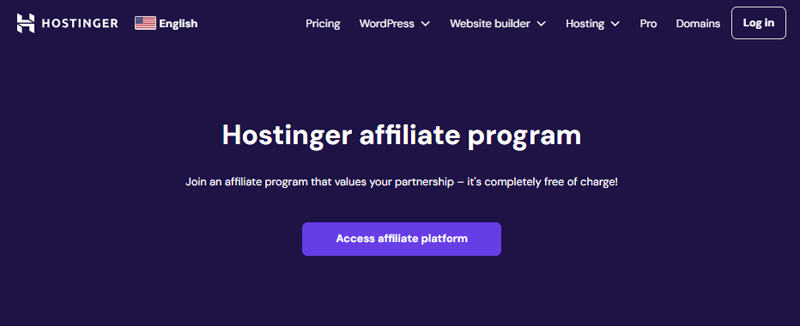
Commission – Hostinger is best known for its high commission rate. For every purchase coming from your affiliate link, Hostinger gives up to 40% commission for Hostinger Shared hosting. With Revenue Share offers the maximum Commission for one sale is $300.
2. Bluehost (Web hosting)
Bluehost is one of the best web hosting companies that offer an affiliate program for anyone looking to make money online. You simply need to promote Bluehost’s product or service in your affiliate platform, and in return, Bluehost pays it all.
Also, joining the Bluehost affiliate program is free of cost.

Commission – Here you can get at least 70% for each qualified sale made from your referred link. There’s no limit to how much you can earn once you put those banners and ads on your site. Their affiliate support team is always here to give personalized tips and advice.
3. Kinsta (Web Hosting)
Kinsta, a premium managed WordPress hosting provider, offers an affiliate program with recurring commissions. Not just that, you’ll gain access to marketing materials and resources to help you effectively promote Kinsta’s hosting services.

Commission – With the Kinsta affiliate program, you can earn a one-time bonus of $500 plus 10% recurring monthly lifetime commissions for every Kinsta WordPress hosting referral.
4. HostGator (Web hosting)
HostGator is a web hosting provider as well as an affiliate program. Joining the HostGator affiliate program helps you earn money by referring HostGator to other customers.

Commission -With HostGator, you’ll earn at least 70% of each sale, capping at $100 per sale. Then with guidance from their Affiliate Support Team, get tips and work together to optimize your growth and potential to earn even more.
You can learn more about selecting web hosting from our article.
5. Shopify (WooCommerce Platform)
Shopify is one of the best WooCommerce platforms available in the eCommerce industry. Here, you can grow your brand with Shopify and earn a commission through a referral program. The program is free to join and allows you to monetize your audience and earn commissions.

Commission – It depends on the types of referrals you’ll make. You can get the complete details here. Let’s take a look at some of them!
| Plan | Commission |
|---|---|
| Shopify Plus | A recurring commission equal to 20% of the Plus merchant’s monthly base platform fee on the billing store. |
| Basic Shopify | A recurring commission equal to 20% of the merchant’s monthly subscription fee. |
| Shopify Apps | Earn 85% of total revenue, it applies to the one-time sale price or recurring subscription fees. And all app purchases or upgrades made through the Shopify App Store. |
| Shopify Theme | 100% of the total revenue from themes sold through the Shopify Theme Store on the first 1,000,000 USD. On revenue over 1,000,000 USD, you earn 85% of total revenue. |
ShareASale is a popular affiliate marketing program that works as a network in-between affiliates and merchants. For the affiliate marketers, it gives access to more than 30,000 brands to work with.
Affiliates can join the ShareASale affiliate program for free of cost.
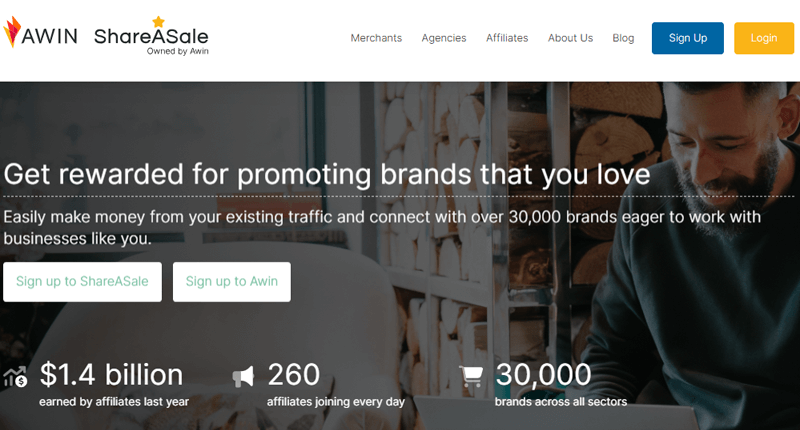
Commission – ShareASale pays the commission to the affiliates based on the sales. Commission rates vary (4%-50%); Fixed structure with a $50 minimum payout.
7. Amazon Associate (Marketplace)
With Amazon Associates, you can sell Amazon products on your affiliate platform, which in return gives you a specific commission amount. Amazon is a popular online shopping market with a high conversion rate, so Amazon’s products are not difficult to sell.

Commission- Since Amazon has a huge product category, the commission rate depends on the product category. Earn up to 10% in associate commissions from qualifying purchases and programs.
8. ClickBank (Marketplace)
ClickBank is a renowned and easy platform for buying and selling products. Anyone can join the ClickBank affiliate program, choose a product, get an affiliate link, and promote it. The program offers thousands of products to promote, with a different commission rate for each product.
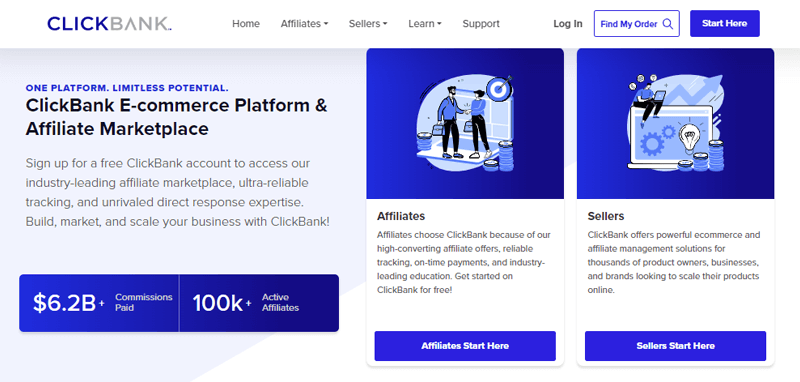
Commission – Like ShareASale, it pays the commission based on the sale. Each product has a different commission rate.
9. Elegant Themes (Divi WordPress Theme)
Elegant Theme is the largest WordPress theme and plugin-building company. It also has an affiliate program that lets you promote its themes and plugins to your audiences and earn a commission.

Commission – It gives a high commission of 50% on all sales plus renewal commission. Also, get 15% commission in the Divi Marketplace with every purchase. It doesn’t just pay you for the initial purchase, so you can keep earning forever.
10. TripAdvisor ( Travel)
TripAdvisor is one of the largest platforms that helps travelers decide their travel journey, accommodation, destination, and many more. Once you join the TripAdvisor affiliate program, you’ll get paid when the visitors sent by you click different ads or links on the TripAdvisor website.
You don’t need to wait for your referrals to purchase the products.
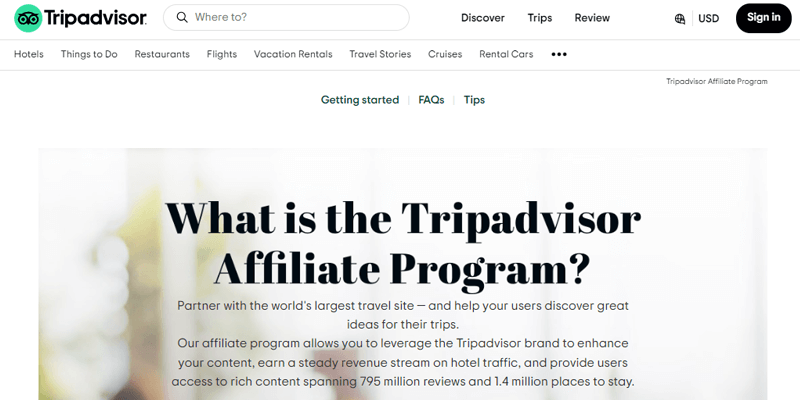
Commission – You’ll receive a minimum 50% commission when you refer a customer to TripAdvisor and they click on the ads or any commercial links.
Tips For Becoming a Successful Affiliate Marketer
So as you know how to start affiliate marketing, let’s take a quick look at some tips on becoming successful.
- Know your audience’s interests, needs, and preferences to tailor your promotions effectively.
- Select products that align with your niche, ensuring relevance and authenticity.
- Be transparent about your affiliate relationships to build trust with your audience.
- Prioritize promoting high-quality products to maintain credibility with your audience.
- Keep up with industry trends to capitalize on popular products and stay relevant.
- Actively engage with your audience through comments, social media, and other platforms to foster a community around your content.
Besides these, regularly track performance metrics to understand what works and make data-driven decisions. Also, don’t forget to create and nurture an email list for direct communication with your audience and strategically promoting affiliate products.
These tips, when applied thoughtfully, can contribute to a successful and sustainable journey in affiliate marketing.
Frequently Asked Questions (FAQs)
1. Who can be affiliate marketers?
Affiliate marketing is quite versatile, and almost anyone can become an affiliate marketer. Bloggers, social media influencers, website owners, and even individuals with a strong online presence can participate. The key is having a platform to promote products or services effectively.
2. Do affiliates have to pay before joining affiliate programs?
Generally, joining an affiliate program is free. Reputable companies usually don’t charge a fee for individuals to become affiliates. Be cautious of programs that ask for payment upfront, as this might indicate a potential scam.
It’s a small piece of data stored on a user’s device by their web browser. It helps track the user’s interactions with the affiliate link. Cookies play a crucial role in attributing sales or leads to the respective affiliates and determining commission payouts.
4. How many followers are necessary for affiliate marketing?
There’s no strict rule on the number of followers needed for affiliate marketing. What matters more is the engagement and influence you have within your audience.
5. Can I promote or sell any product that I’ve never tried before?
While it’s not a strict requirement to have tried every product you promote, it’s generally advisable to have some level of familiarity. Genuine recommendations based on personal experience tend to resonate better with your audience.
Conclusion
And, that’s all for now.
Hopefully, by now, you have an idea of affiliate marketing basics and what it takes to get started with affiliate marketing. Also, there’s no doubt that affiliate marketing can give you amazing returns on promotion.
We hope you enjoyed this beginner’s introduction to affiliate marketing. Our goal is to help you start your business in affiliate marketing and establish the essential requirements.
Feel free to use this article to learn how affiliate marketing works and what you must consider before starting. Please comment below if you have any questions about affiliate marketing.
Besides affiliate marketing, there are more ways you can make money online. Check our guide 41 Ways to Make Money Online.
Also, you can check our article on, how to choose a domain name for affiliate marketing and how to build an affiliate marketing website.
Follow our site on Facebook and Twitter for fresh and exciting content.

